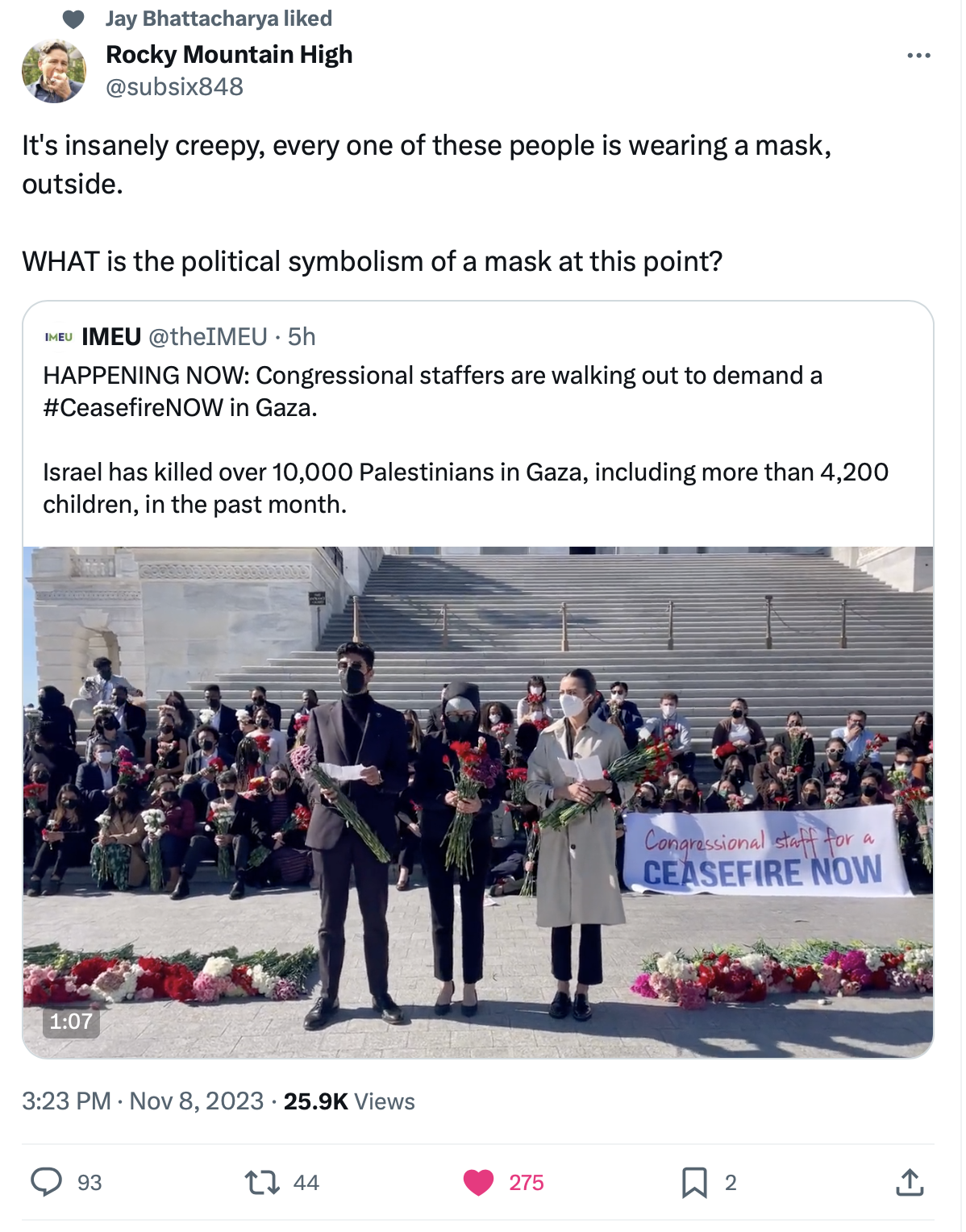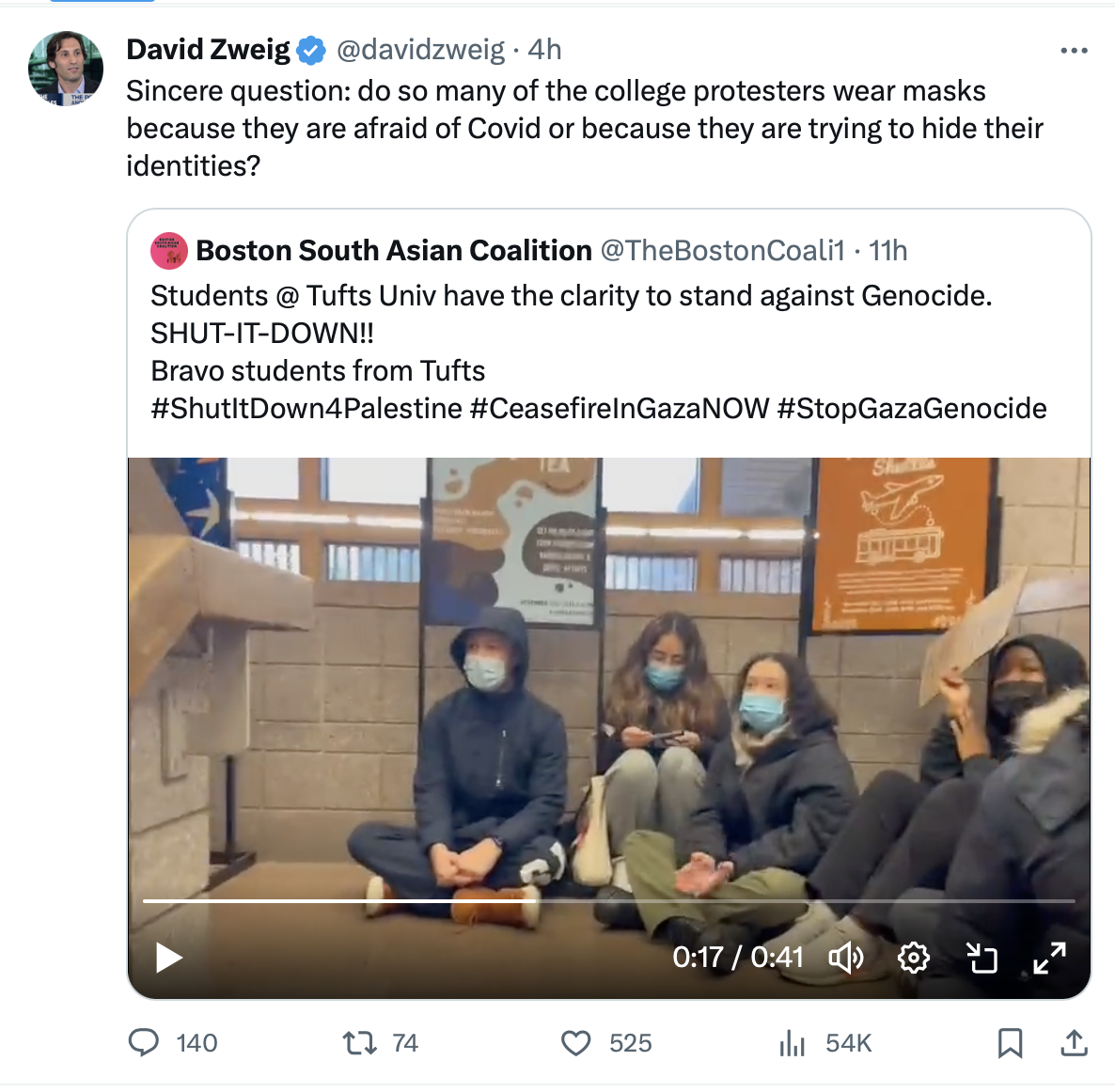Many years ago, I read Moral Politics (1996), in which George Lakoff tried to make sense to the two baskets of positions taken by the two political parties. He was intrigued by the idea that Republicans strongly cling to positions that didn’t seem to have any coherent underlying value. What does a strong Second Amendment position have to do with being anti-abortion? What does willingness to through one’s weight around in the world using the military have to do with Prayer in Schools, cutting welfare assistance or attempting to limit jury awards on tort cases? Then Lakoff realized that he, a self-proclaimed liberal, took the opposite position on all of those issues. In short, he had his own basket of seemingly unconnected issues. But, he thought, there must be an underlying basis for these two opposing collections of issue-positions. When I read his book, I wondered the same thing.
Lakoff concluded that there, indeed, were separate foundations for the Liberal and Conservative mindsets. He called these the “Strict Father Model” and the “Nurturant Parent Model.” See pp 33-35. Lakoff claims that at the center of the conservative worldview is the Strict Father Model.
This model posits a traditional nuclear family, with the father having primary responsibility for supporting and protecting the family as well as the authority to set overall policy, to set strict rules for the behavior of children, and to enforce the rules. The mother has the day-to-day responsibility for the care of the house, raising the children, and upholding the father’s authority. Children must respect and obey their parents; by doing so they build character, that is, self-discipline and self-reliance. Love and nurturance are, of course, a vital part of family life but can never outweigh parental authority, which is itself an expression of love and nurturance—tough love. Self-discipline, self-reliance, and respect for legitimate authority are the crucial things that children must learn.
Once children are mature, they are on their own and must depend on their acquired self-discipline to survive. Their self-reliance gives them authority over their own destinies, and parents are not to meddle in their lives.
According to Lakoff, the liberal worldview centers on a very different ideal of family life, what he calls the Nurturant Parent model:
Love, empathy, and nurturance are primary, and children become responsible, self-disciplined and self-reliant through being cared for, respected, and caring for others, both in their family and in their community. Support and protection are part of nurturance, and they require strength and courage on the part of parents. The obedience of children comes out of their love and respect for their parents and their community, not out of the fear of punishment. Good communication is crucial. If their authority is to be legitimate, parents must explain why their decisions serve the cause of protection and nurturance. Questioning by children is seen as positive, since children need to learn why their parents do what they do and since children often have good ideas that should be taken seriously. Ultimately, of course, responsible parents have to make the decisions, and that must be clear.
The principal goal of nurturance is for children to be fulfilled and happy in their lives. A fulfilling life is assumed to be, in significant part, a nurturant life; one committed to family and community responsibility. What children need to learn most is empathy for others, the capacity for nurturance, and the maintenance of social ties, which cannot be done without the strength, respect, self-discipline, and self-reliance that comes through being cared for. Raising a child to be fulfilled also requires helping that child develop his or her potential for achievement and enjoyment. Th it requires respecting the child’s own values and allowing the child to explore the range of ideas and options that the world offers.
Lakoff contrasted these two models in a way that would intuitively sound correct to many people who traditionally vote for Democrats:
Strict Father morality assigns highest priorities to such things as moral strength (the self-control and self-discipline to stand up to external and internal evils), respect for and obedience to authority, the setting and following of strict guidelines and behavioral norms, and so on. Moral self-interest says that if everyone is free to pursue their self-interest, the overall self-interests of all will be maximized. In conservatism, the pursuit of self-interest is seen as a way of using self-discipline to achieve self-reliance.
Nurturant Parent morality has a different set of priorities. Moral nurturance requires empathy for others and the helping of those who need help. To help others, one must take care of oneself and nurture social ties. And one must be happy and fulfilled in oneself, or one will have little empathy for others. The moral pursuit of self-interest only makes sense within these priorities.
There’s a big problem with Lakoff’s analysis. From 1996 to the present, those who identify as “liberals” have dramatically flipped their positions on censorship, warmongering, race consciousness, trust in the U.S. security state. Did these issues become more “nurturing?” It’s impossible to account for these 180 degree turns using a Strict Parent/Nurturant Parent analysis. Over time, conservatives have also turned themselves into pretzels, as discussed in a new book, The Myth of Left and Right, by brothers Hyrum and Verlan Lewis (2023). When they voted for Trump in large numbers, Republicans decided that the type of morality they had strongly touted for decades was no longer important.
Self-identified conservatives and liberals have also recently switched places on the importance of personal morality in public officials. During the Clinton years, conservatives were nearly unanimous in believing that the personal char acter of a politician was crucial to his or her performance in office – it was one of their central justifications for impeaching President Clinton- but as soon as Trump assumed leadership of the right, conservatives reversed course. Before Trump, only 36% of Republicans believed that “public officials can behave ethically in their professional roles even if they acted immorally in their personal life,” but after Trump’s nomination, that number shot up to 70%.54 More recently, Gallup found that:
Six in ten Republicans say they would rather have a president who agrees with their political views but does not set a good moral example for the country, as opposed to one who sets a good moral example but does not agree with them politically. In contrast, 75% of Democrats prefer a president who sets a good moral example over one who agrees with (their issue positions. In 1999, Republicans’ and Democrats’ opinions were reversed, with Republicans favoring a president who sets a good moral example and Democrats preferring one who agrees with them politically.
The timing makes it clear that this reversal had nothing to do with an underlying essential principle and everything to do with changes in tribal leadership. When The Development of Left and Right 35 the leader of the right is low on moral character, those on the right will say character doesn’t matter; when the leader of the left is low on moral character, those on the right will say it matters a great deal. Where is the “essential principle” behind all of this ideological flux on key issues? It does not exist.
What’s going on? What is the underlying telos of what it means to be a Democrat? Or what it means to be a Republican? The answer of Hyrum and Verlan Lewis is that there is no underlying telos. There is nothing that conceptually glues together the positions of Democrats (the positions that differ from the positions of Republicans). Nothing other than tribal forces. Democrats and Republicans are merely tribes.
The standard view of ideology says that politics is largely a clash between two worldviews that can be modeled on a political spectrum. The left-wing worldview, we are told, is expressed in a preference for greater government control of the economy, social permissiveness, and foreign policy dovishness, while the right-wing worldview is expressed in a preference for free markets, social restriction, and foreign policy hawkishness.* Taking these worldviews to extremes leads to totalitarianism-fascism at the far right or communism on the far left-while the more respectable positions exist at the center left (“liberalism” or “progressivism”) and center right (“conservatism”).
This model of politics frames our thinking, shapes our language, and sets the terms of public debate. It creates a sense of personal identity for millions of Americans, is taught in classrooms across the country, and is used in nearly every political discussion, whether on social media, in the halls of Congress, on cable news, or around the dinner table. It is, without question, the most influential political paradigm of twenty-first-century. America.
It is also completely wrong.
The political spectrum does not tell us where someone stands in relation to a fundamental worldview or philosophy (or disposition, temperament, belief, value, or any other “essence”); it only indicates a commitment to a tribe. As long as binary coalitions characterize our politics, the political spectrum can be useful for modeling commitment to those coalitions and what they stand for at a specific place and time, but it becomes misleading as soon as we assume that it is modeling a commitment to an underlying essence
For more, I highly recommend The Myth of Left and Right. Also, consider listening to the excellent podcast discussion led by Coleman Hughes (below) and/or his Substack article on this topic.
[Added Nov 8, 2023]
Perfect example supporting The Myth of Left and Right. Somehow, every one of these people seeking a cease-fire in Gaza is also terrified of getting COVID in 2023 and is willing to wear a mask, even though masks have been shown to be of no benefit.
[Added Nov 9, 2023]
Here’s another:



